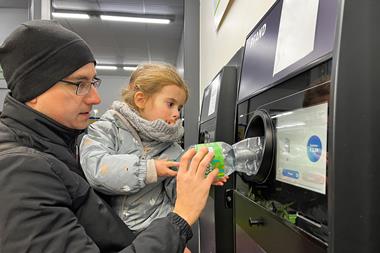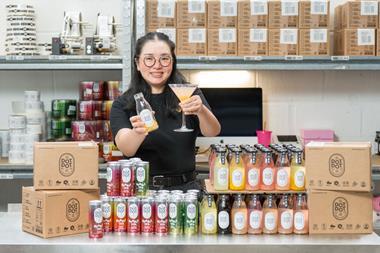Budget energy drink Boost is reaching new heights. Having stolen some thunder from its premium rivals, it’s planning to raise its profile even further. Alex Beckett finds out how
Energy drink? Tick. Budget priced and with a controversial marketing campaign? Tick, tick. Fmcg historians of the future could look back at Boost drinks as a key brand of our times. Standing alongside flashy American rivals such as Relentless, Monster and Powerade and market leader Red Bull Boost's bottle even looks like a time capsule. But this is a case of substance over style.
This budget pick-me-up has provided a recession-friendly alternative to the glut of pricier offerings on the market, at a time when having change from £1 is impressive. And we are not talking coppers here while a 500ml can of Monster or Relentless has an rsp of about £1.25, a 500ml bottle of Boost's top-selling SKU retails for 85p.
The simple packaging of the 16-strong portfolio is as uncomplicated as the brand's 'It's a No Brainer' strapline. It's also comparable to the no-frills business approach of Yorkshireman Simon Gray, Boost's founder and MD. Since the brand was launched eight years ago, Gray's focus has been on c-stores, believing the format more appropriate for impulse shoppers.
"In energy drinks there are a lot of premium players, but we are leading the way in the value sector," says Gray. But a change could be on the cards. "We have possible plans to enter the multiples. I have to be aware of ways of gaining added value."
If Gray was to make this move, he'd be doing so from a strong base. Boost's sales have leapt 38.3% to £13.5m over the past 12 months and it was ranked 44 in The Sunday Times Virgin Fast Track 100 earlier this year. But the growth is not just down to shoppers cutting costs, says Gray.
"We might have benefited a little from people trading down, but I didn't set the business up in response to the recession," he says. "And when the clouds lift, there are plenty of avenues to go down, such as ex-pat communities and foodservice."
A lively NPD programme is a key growth driver, says Gray. As Relentless and Lucozade followed Red Bull into the energy shot market last year, Boost also brought out its own version for 99p as much as 79p cheaper than its rivals. In February, it launched Boost Energy Cola. The portfolio now comprises an isotonic sports range, two smoothies, two glucose-packed Active drinks and the core Energy line-up.
"We will look to develop more NPD that plays in functionality, maybe in non-caffeinated drinks," he says.
Surprised at the dearth of low-priced Red Bull alternatives on the market, Gray, who once ran a grocery wholesale business, used contacts in the soft drinks industry to help get the business off the ground.
Markets as far off as Ghana have opened up, but the brand's UK profile is Gray's priority. The 'No Brainer' campaign kicked off in April, featuring slogans such as "Until I drank Boost, the only cheap thrills I got were from your sister" a reaction to a market crying out for humour, he says.
"Until now we have been focused on investing in the trade. But for the rest of 2010 and 2011 we will concentrate on raising awareness of the brand."
It's hard to imagine the big four ignoring those kind of cheap thrills.
Energy drink? Tick. Budget priced and with a controversial marketing campaign? Tick, tick. Fmcg historians of the future could look back at Boost drinks as a key brand of our times. Standing alongside flashy American rivals such as Relentless, Monster and Powerade and market leader Red Bull Boost's bottle even looks like a time capsule. But this is a case of substance over style.
This budget pick-me-up has provided a recession-friendly alternative to the glut of pricier offerings on the market, at a time when having change from £1 is impressive. And we are not talking coppers here while a 500ml can of Monster or Relentless has an rsp of about £1.25, a 500ml bottle of Boost's top-selling SKU retails for 85p.
The simple packaging of the 16-strong portfolio is as uncomplicated as the brand's 'It's a No Brainer' strapline. It's also comparable to the no-frills business approach of Yorkshireman Simon Gray, Boost's founder and MD. Since the brand was launched eight years ago, Gray's focus has been on c-stores, believing the format more appropriate for impulse shoppers.
"In energy drinks there are a lot of premium players, but we are leading the way in the value sector," says Gray. But a change could be on the cards. "We have possible plans to enter the multiples. I have to be aware of ways of gaining added value."
If Gray was to make this move, he'd be doing so from a strong base. Boost's sales have leapt 38.3% to £13.5m over the past 12 months and it was ranked 44 in The Sunday Times Virgin Fast Track 100 earlier this year. But the growth is not just down to shoppers cutting costs, says Gray.
"We might have benefited a little from people trading down, but I didn't set the business up in response to the recession," he says. "And when the clouds lift, there are plenty of avenues to go down, such as ex-pat communities and foodservice."
A lively NPD programme is a key growth driver, says Gray. As Relentless and Lucozade followed Red Bull into the energy shot market last year, Boost also brought out its own version for 99p as much as 79p cheaper than its rivals. In February, it launched Boost Energy Cola. The portfolio now comprises an isotonic sports range, two smoothies, two glucose-packed Active drinks and the core Energy line-up.
"We will look to develop more NPD that plays in functionality, maybe in non-caffeinated drinks," he says.
Surprised at the dearth of low-priced Red Bull alternatives on the market, Gray, who once ran a grocery wholesale business, used contacts in the soft drinks industry to help get the business off the ground.
Markets as far off as Ghana have opened up, but the brand's UK profile is Gray's priority. The 'No Brainer' campaign kicked off in April, featuring slogans such as "Until I drank Boost, the only cheap thrills I got were from your sister" a reaction to a market crying out for humour, he says.
"Until now we have been focused on investing in the trade. But for the rest of 2010 and 2011 we will concentrate on raising awareness of the brand."
It's hard to imagine the big four ignoring those kind of cheap thrills.



















No comments yet